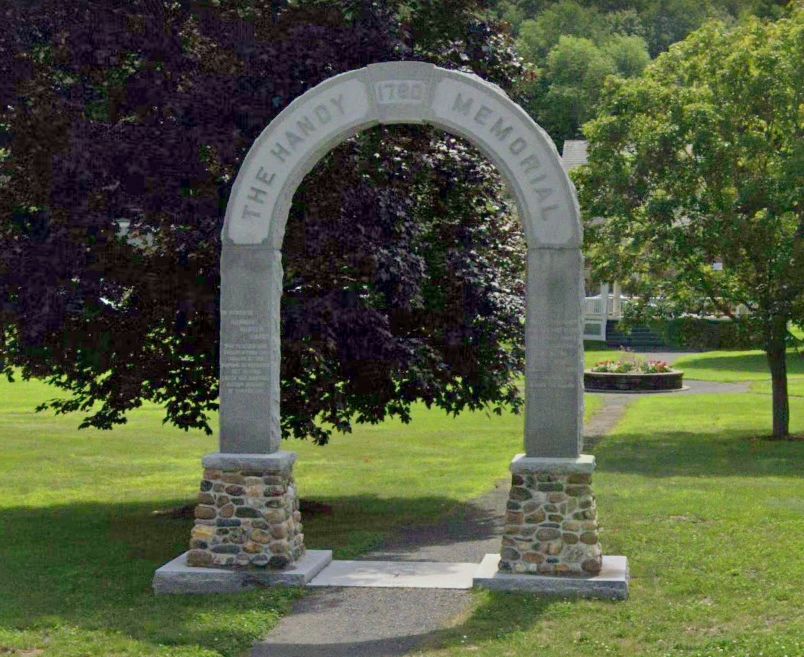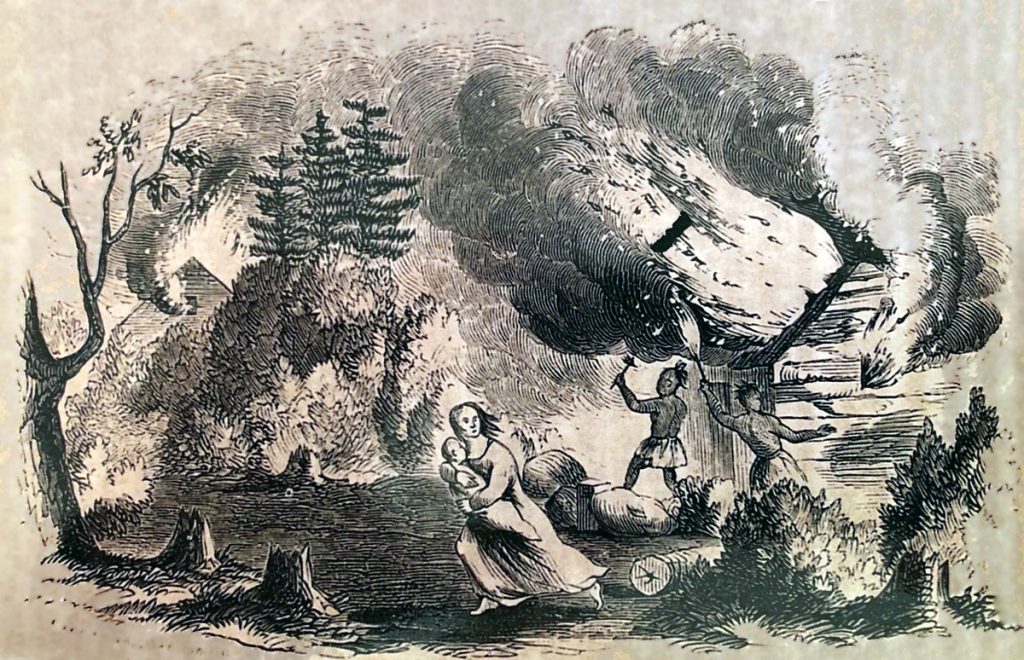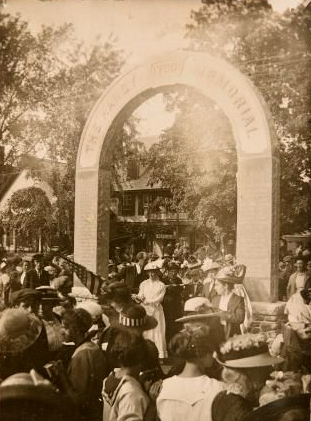

In Episode 254, Jeff Belanger and Ray Auger explore the town green of South Royalton, Vermont, searching for the memorial to Hannah Handy–the only memorial to a woman from the Revolutionary War in the state of Vermont. On October 16, 1780, Handy rescued nine children who were taken prisoner in a British raid. Her story was almost lost if not for a local historian who lobbied her town to raise funds for a monument.
CALL (OR TEXT) OUR LEGEND LINE:
(617) 444-9683 – leave us a message with a question, experience, or story you want to share!
BECOME A LEGENDARY LISTENER PATRON:
https://www.patreon.com/NewEnglandLegends
CREDITS:
Produced and hosted by: Jeff Belanger and Ray Auger
Edited by: Ray Auger
Theme Music by: John Judd
SUBSCRIBE TO THE PODCAST FOR FREE:
Apple Podcasts/iTunes | Google Podcasts | Spotify | Pandora | Stitcher | Amazon Podcasts | TuneIn | iHeartRadio
JOIN OUR SUPER-SECRET:
New England Legends Facebook Group



EPISODE TRANSCRIPT:
*A note on the text: Please forgive punctuation, spelling, and grammar mistakes. Like us, the transcripts ain’t perfect.
JEFF: Ray, when my daughter was born, I remember my buddy Dave telling me that being a parent means you’re scared all the time.
RAY: I get that. Suddenly with your own kids, the world seems like a much more dangerous place than when you only had to worry about yourself.
JEFF: We’re both parents, and of course we’d do anything for our kids.
RAY: Of course!
JEFF: But if someone ever threatened one of your kids, who would that person have to worry about more? You, or your wife.
RAY: No question. I’d kill any threat to my kids, but Mama Bear would make them suffer first.
JEFF: Same. There’s something about a mom defending her kids. Only a fool would ever get between a momma and her cub. Which is what brings us to Royalton, Vermont.
RAY: We’re standing on the town green in the center of town. It’s a pretty little Vermont town situated on the banks of the White River. There’s a cute little Gazebo on one side of the park.
JEFF: And on the opposite side of the green is this granite arch.
[WALKING]
RAY: It reads: The Handy Memorial 1780, and there are some names inscribed on the stone.
JEFF: This is Vermont’s only Revolutionary War monument dedicated to a woman. We’ve come to Royalton, Vermont, searching for a hero named Hannah Handy.
[INTRO]
JEFF: Hello, I’m Jeff Belanger.
RAY: And I’m Ray Auger. Welcome to episode 254 of the New England Legends podcast. Thank you for joining us on our mission to chronicle every legend in New England one story at a time.
JEFF: We’re a community of legend seekers who are always on the hunt for roadside oddities, heroes, ghosts, monsters, aliens, and just about anything else that bumps in the night. Did you know that most of our story leads come from you? This one did! Thanks to Evan Thomas for sending this one in. Don’t assume we’ve heard of the strange tale from your town. Please reach out to us anytime through our Web site, through our super secret Facebook group, or on social media. We love hearing from you.
RAY: We also love when you subscribe to our podcast, because it’s free. We don’t want you to miss a thing. And tell a friend or two about our show. It’s how we grow.
JEFF: Before we go looking for the hero that is Hannah Handy, we want to take just a minute to tell you about our sponsor, Nuwati Herbals!
RAY: Since it’s summer, we want to protect our children of ALL ages from mosquitos, ticks, and of course sunburns. Step one, you need to keep some No-Ski-To all natural insect repellent around from Nuwati Herbals.
JEFF: No-Ski-To is DEET-free, so it’s safe for your kids and around your pets. Made with essential oils, it naturally repels all of those annoying insects of the summer season.
RAY: We also know that no matter how careful we are, sometimes we get poison ivy, or sunburns, or bug bites.
JEFF: We do. And the worst part about those kind of skin problems is that they can last for days. The itching, the burning, it’s awful!
RAY: That’s why Nuwati Herbals offers their Moccasin Tracks Balm. Made with all natural ingredients like plantain leaf, calendula flowers, and white willow bark, this balm will sooth those bites and burns right away.
JEFF: There’s also Moccasin Tracks body oil. Using some of the same natural ingredients as the balm, the base has extra virgin olive oil and corn oil as a moisturizer. You can add some to your bath tub, or rub some oil on your skin post-shower to sooth and moisturize your irritated skin.
RAY: Nuwati Herbals is a family run business, and almost all of their products are made by hand.
JEFF: Let Nuwati Herbals help support your healthy lifestyle. Check out the Nuwati Herbals Web site to see all of their great products AND you get 20% off your order when you use the promo code LEGENDS20 at checkout. Visit Nuwati Herbals dot com. That’s N-U-W-A-T-I Herbals with an S dot com.
RAY: So this Handy Memorial in the center of Royalton, Vermont, is the state’s ONLY monument to a woman from the Revolutionary war?
JEFF: It is. I’m quite sure other Vermont women performed heroic acts during the Revolutionary War, but this one was remembered, or rather rediscovered by a Royalton historian named Evelyn M. Wood Lovejoy who authored a two-volume History of Royalton back in 1911.
RAY: To figure out how and why this monument got here, let’s head back to 1780, and meet Hannah Handy.
[TRANSITION]
RAY: It’s October of 1780. We’re more than five years in to the Revolutionary War, and it’s NOT going well for the British.
JEFF: But for the Handy family here in Royalton, a frontier community on the banks of the White River, they’re more concerned with their day-to-day survival than who they pay taxes to.
RAY: Still, there’s word of trouble getting closer lately. People here are nervous.
JEFF: The first shot of the Revolutionary War was fired in Massachusetts on April 19, 1775. The British had hoped to crush the rebellion quickly, and put the colonies back in line, but the American will to fight has been strong. July 4th, 1776, America declared its independence from England, but King George isn’t going to let the colonies go that easily. Plus, there are still plenty of loyalist who prefer to remain subjects of the king. In December of 1776, George Washington crosses the Delaware River, and brings the fight to the British and their German allies. By 1778, France got involved in the fight against the British, and all over the colonies, the British are getting hammered.
RAY: When people are fighting for their homes, it makes for a formidable enemy.
JEFF: No doubt. Now that it’s 1780, it’s clear the direction of the war is going America’s way. In fact, the British have pretty much already lost the northern states, so they’re resorting to terror tactics on the frontier settlements in the hopes of keeping America from spreading north into British Quebec. The British are forming new alliances with natives from the north, specifically the Mohawk and Abenaki.
RAY: Over the last several weeks, a handful of British soldiers led by Lieutenant Richard Houghton have gathered Mohawk and Abenaki forces to lead raids on villages along the Mohawk River Valley in New York, and the White River in Vermont.
JEFF: It’s October 16th here in the quiet village of Royalton, Vermont. There are about 25 homes located on both sides of the White River. Everyone is on edge. There’s been talk of Indian raids. People are being captured and killed. It’s quiet… too quiet… Suddenly.
[YELLING FIRES BURNING MUSKET SHOTS]
JEFF: The Mohawk and Abenaki are moving from house-to-house, capturing prisoners, killing livestock, and burning the houses and barns before moving on to the next home.
RAY: At the Handy home, Robert sees the fires in the distance, and immediately jumps on his horse.
[HORSE GALLOPING]
RAY: And races west toward a nearby fort in Bethel, Vermont. He tells his wife, 27-year-old, Hannah to hide with their young son, Michael, and their younger daughter Lucretia, while he brings back reinforcements.
JEFF: The raid continues through Royalton. In the confusion, Michael is snatched away, but Hannah Handy manages to escape and hide with Lucretia where she’ll have to wait until the raid is over. Most of the town is burned, and many prisoners are captured. Not just Michael Handy, but other young kids as well, plus 34 adult men from Royalton.
[RAID FADES AWAY]
[MANY HORSES GALLOPING]
RAY: By that night, 300 militia from Vermont have gathered and tracked the raiding party. They start to attack…
[MUSKET FIRE]
RAY: But quickly shut down when they’re warned that the raiding party will execute their prisoners. So the militia retreats.
JEFF: Back in Royalton, the survivors are despondent. Most have lost their homes and livestock. Many have lost children. And the local militia failed to do anything about it. They learn the British plan is to march all of the prisoners to Canada. Given that it’s already mid-October, and the journey will take weeks. Many won’t survive that cold march.
RAY: Hannah Handy is seething. While others are fretting, she takes action. The Handy family had helped a local Indian recently, and he seemed eager to repay the kindness. He offers to guide Hannah to the raiding party’s camp.
[RIVER FLOWING]
RAY: Hannah and her guide cross the White River, and walk all the way to the camp where she sees British Lieutenant Houghton, the Mohawk and Abenaki, and the prisoners from Royalton.
JEFF: Hannah marches up to Houghton, and informs him she’s come to retrieve her son. Lieutenant Houghton explains her son is now a prisoner who will be marched to Canada. That’s when Hannah explains to Houghton that her young son won’t likely survive that journey, and that his blood would be on Houghton’s hands. She appeals to him that he’s above killing a child. Houghton ponders for a moment. He considers himself a civil gentleman if nothing else. So he agrees to turn Michael back over to his mother.
RAY: Hannah, though, isn’t finished. She sees an opportunity. She tells Lieutenant Houghton, that if ANY of the child prisoners die on the march to Canada, that their blood will also be on his hands. And even worse for the British is that if those children die, it will turn public sentiment even more sour on British rule. In short, it would be bad for the British war effort. Houghton agrees again, and ultimately turns eight more children over to Hannah Handy, who marches them back home to Royalton. And THAT brings us back to today.
[TRANSITION]
JEFF: Hannah Handy’s heroic act was NOT forgotten in Royalton. Nine children came home that day thanks to a mother who would NOT take no for an answer. We know Hannah’s husband died soon after the raid, but we don’t know his cause of death, and Hannah remarried. She eventually moved to Hoosick Falls, New York, to live with her daughter, Lucretia. Her date of death, or even where she’s buried is unknown.
RAY: Hannah’s story would have eventually faded into the background here in Royalton if not for the efforts of local historian, Evelyn Lovejoy who we mentioned earlier. Lovejoy authored the History of Royalton back in 1911. Royalton makes the case that there were descendants of those nine children living in town right now, who owe a monument to Handy as a token of thanks.
JEFF: So Lovejoy wrote letters, she asked friends and neighbors to contribute some money for a memorial. At one point, the Mormon Church donated $200 dollars, but so many local Protestants were so angered by the Mormon donation that they threatened to withhold their own donations. In the end, Lovejoy returned the Mormon money, even though she was appalled by the bigotry in town.
RAY: It takes several years, but by August of 1915, Lovejoy is ready to see all of her hard work and lobbying come to fruition in the form of this stone arch installed on the town green. The inscription reads: “In honor of Hannah Hunter Handy who rescued nine children from the Indians at the burning of Royalton, Oct.16, 1870. Later she married Gideon Mosher of Sharon, Vermont.” The other side of the arch lists the names of those captured, killed, and rescued in the Burning of Royalton, in 1780.
JEFF: The timing of this memorial is also important. When Lovejoy’s book came out in 1911, Women’s Suffrage was a growing issue in the United States. Women were fighting for the right to vote. Part of the battle for that right, was to show the world contributions that woman make and have made throughout time. History is told by the winners, and most often by men. Women have often been left out of the narrative. When this stone arch was erected in 1915, it showed everyone in town that some of their neighbors wouldn’t even be alive if not for a woman who acted when families were caught off guard, and when the local militia failed. A hero named Hannah Handy.
[OUTTRO]
RAY: Five years later in 1920, the 19th amendment to the constitution was ratified, giving women the right to vote. (BEAT) And that brings us to After the Legend where we take a deeper dive and sometimes go right off the rails.
JEFF: After the Legend is brought to you by our Patreon patrons! This group of insiders are the backbone of everything we do. It takes a lot to bring you a new story each and every week. There’s our hosting and production costs, marketing costs. It’s a big undertaking. But you can help. For just $3 bucks per month you get early access to new episodes, plus bonus episodes and content that no one else gets to hear. Just head over to Patreon.com/newenglandlegends to sign up.
Please be sure to subscribe to our podcast wherever you get your podcasts, because it’s free! And please help spread the word. YOU telling others is how our community continues to grow.
We’d like to thank our sponsor, Nuwati Herbals, and our theme music is by John Judd.
Until next time remember… the bizarre is closer than you think.
